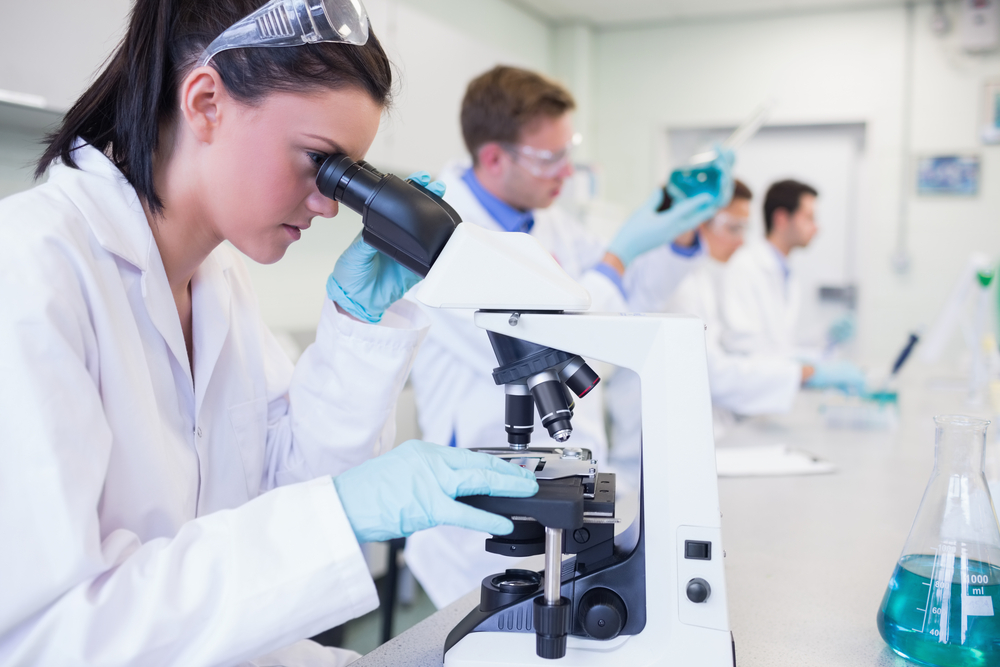
Laboratories
The LABGEN holds real-time PCR, thermocyclers, PCR and security booths for DNA extraction, -80ºC freezer facilities, electrophoresis tanks and sources, photo-documenter, electrophoresis systems, refrigerators, autoclaves, scales, microwave, greenhouses, systems for immune-detection and other small equipment for general use.
This laboratory has laminar flow, oven, refrigerator, freezer, scale, centrifuge, autoclave, distiller, spectrophotometer, pH meter and small auxiliary bench equipment.
LABORAFE has a high-performance Dimension AR equipment for biochemical measurements, Cell-Dyn 3700 and Sysmex KX-21N for hematology, Immulite 1000 for hormone measurement, immunological analysis and tumor biomarkers, Coagutimer for enzymatic analysis and electrophoresis instruments. It also has a continuous flow spectrophotometer, flame photometer, thinner, Elisa reader, Elisa washer, several centrifuges, deionizer, freezer and refrigerators.
This laboratory has computers for digital processing, stereoscopic trinocular loupe, 1 Tb computer with image and measurement software, light microscope coupled to a 1 Tb computer, several other computers, printers, cameras and flashes.
It has a Bruker micro-tomography equipment, computer workstations, cutter, diamond cutting discs and a universal mechanical testing machine.
LAMP has laminar flow, CO2 incubator, thermocycler, microscopes, centrifuges, electrophoresis instruments, scale, pH meter, refrigerator, freezer, microwave, spectrophotometer, in addition to small complementary instruments, computers and cell culture facilities.
This laboratory is equipped with a welding machine, ovens, micromotors, cutters, presses, centrifuges, sand trijate, photopolymerizers, amalgamators and vacuum laminators, in addition to computers.
PDC-Saúde, together with the dental clinic, is the translational setting of the program. It operates in a five-story building, with 53 offices equipped with a physical examination table, negatoscope, blood pressure measuring devices, ophthalmoscope and anthropometric scale. It has specialized rooms for Gynecology, Ophthalmology, Otolaryngology and Urology. It has two operating rooms and a recovery room. In addition, it has an Integrated Diagnostic Medicine Center with Clinical Pathology Laboratory and Imaging Department (high-resolution computerized tomography, high-resolution mammography, conventional radiology, ultrasound, color Doppler ultrasound, vascular ultrasound, video-colposcope), electrocardiographs and treadmill with exercise test to assess respiratory capacity.
The clinic for non-infectious patients has 79 complete dental sets equipped with biosafety, ultrasonic cleaners, X-ray machines, electric scalpel, ultrasound, photo-polymerizers, dark rooms and microscope for endodontics. Attached to this clinic, there is another one with isolation for infectious patients with 36 semiautomated sets and similar to the others. It has stretchers and equipment for resuscitation and a complete sterilization center, with an exclusive area for dressing and dressing to meet current biosafety protocols.
Euclides da Cunha Library
UNIGRANRIO is the largest educational institution in the Baixada Fluminense region (Metropolitan area of Rio de Janeiro), with students coming from different municipalities. Therefore, due to the educational, scientific and social relevance of the University in the region, the Euclides da Cunha Library, located on the Program Campus, is one of the largest libraries in the Baixada Fluminense.
Currently, the Library's collection corresponds to 57,719 titles, of which 138,417 are copies. In the library's existing laboratory, 28 (twenty-eight) computers with access to the UP TO DATE system are available to the public. The space has the following human resources: 2 librarians, 1 assistant, 5 assistants and two young apprentices.
Inaugurated in 1972, the Library is open from Monday to Saturday. It has a Library Coordination Center (NCB), composed of 10 individual libraries, a Document Conservation and Restoration Unit (UCORE) and a Computer Laboratory. It occupies 2,000 m2, encompassing the reception, a collection hall, reading rooms, group study rooms, individual study booths and hall for exhibitions and events.
The Library has access to the Theses and Dissertations Base (BDTD), allowing data sharing with the Brazilian Library of Theses and Dissertations and with the Networked Digital Library of Theses and Dissertations (international database). Finally, there is access to the SCIELO (Scientific Electronic Library Online) database, which covers a selected collection of Brazilian scientific journals. UNIGRANRIO has franchised access to the Scopus and Science Direct databases through the CAPES Journal´s Portal, which covers central publications on Biological and Health Sciences.
The CAPES Journal´s Portal is fully available to UNIGRANRIO professors, students and teaching researchers, offering access to the full texts of selected articles from international and national magazines. Currently, professors and students of Postgraduate programs have remote access to CAPES journals, in addition to the intense use of the UP TO DATE system – a database widely used by health academics, which provides articles written by renowned authorities on each topic and that facilitate the quick and effective updating of these professionals.
In addition to the extensive collection of the Library, users have Wi-Fi access in the reading rooms to different databases, such as:
Classroom
Study room